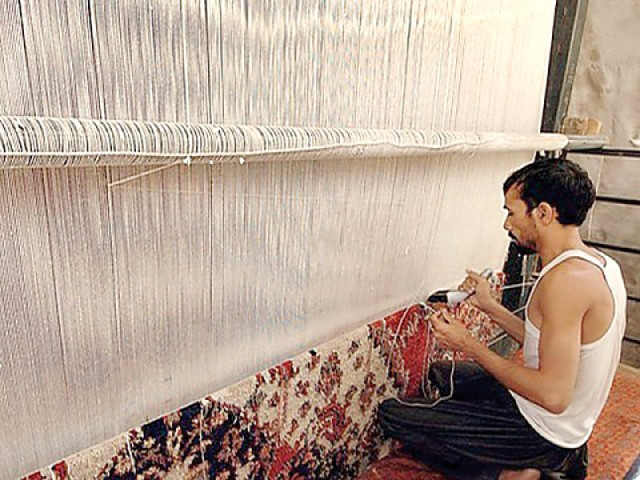Job creation: Carpet industry vies for a stake in PM loan scheme
Scheme is best suited for carpet manufacturers, says body chairman.

Loans could be used to set up small manufacturing units in rural areas consisting of five to 10 handlooms. PHOTO: FILE
The Pakistan Carpet Manufacturers and Exporters Association (PCMEA) has asked the government to collaborate with the body on disbursement of loans through the Prime Minister’s Youth Business Loan Scheme.
The carpet industry’s representative body believes the industry is best suited for job creation in rural areas, which is the primary focus of the loan scheme.
PCMEA Chairman Akhtar Nazir Khan, in a letter written to Prime Minister Nawaz Sharif, stressed that business loans could be used to set up small manufacturing units in rural areas consisting of five to 10 handlooms and offered the association’s assistance in assessing and recommending eligible candidates.

“To ensure the return of money, loans for the carpet sector may be disbursed through exporters,” he suggested.
Welcoming the initiative, he said the scheme would create new job opportunities and address poverty.
He pointed out that the handmade carpet industry was labour-intensive and mostly involved female workers, who worked within their homes with the lowest cost of employment. “With a view to accommodating the professionally trained workers, it is proposed that the condition of education (for the loan) may be reconsidered,” he said.
The association asked the premier to set aside Rs1 billion for the handmade carpet industry in order to create 13,000 jobs in the most underprivileged and the bottom 5% strata of the society.

Vice Chairman Kamran Razi said the process of producing handmade carpets was quite lengthy and extremely slow and as such the industry could not afford 8% mark-up. Loans to the industry may be allowed at 3% service charges, he suggested.
According to the association, exports of handmade carpets come from the most scattered and unorganised manufacturing sector in the country, which constitutes the largest cottage industry. This 100% exportable product creates at least 600% value addition and provides livelihood to more than one million people in remote areas.
Razi said the export of carpets, which was $285-300 million just five years ago, has been continuously declining, standing at $136 million in 2009-10, $132 million in 2010-11 and $120 million in 2011-12. Continuous inflation, increasing utility rates and business losses have led to severe liquidity problems for the industry, he added.
Published in The Express Tribune, February 9th, 2014.
Like Business on Facebook, follow @TribuneBiz on Twitter to stay informed and join in the conversation.



















COMMENTS
Comments are moderated and generally will be posted if they are on-topic and not abusive.
For more information, please see our Comments FAQ